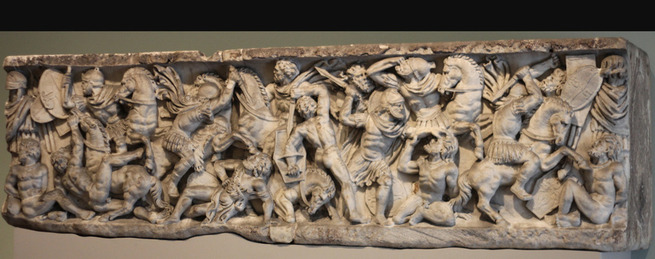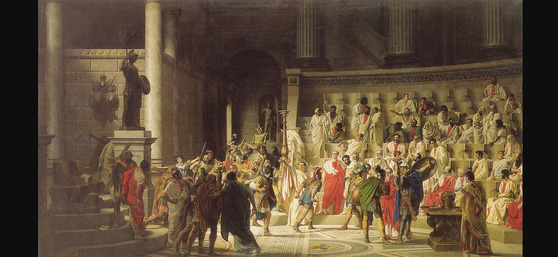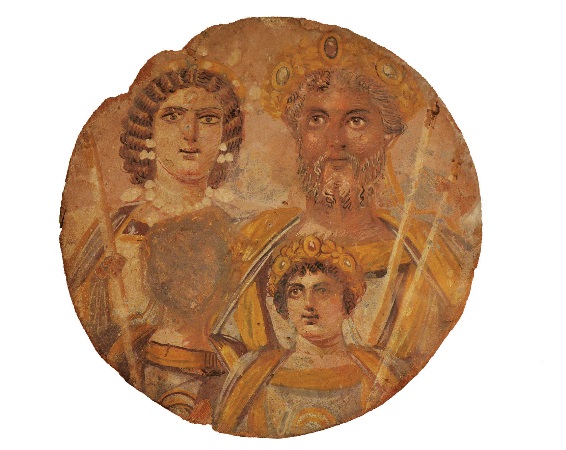Victorious Roman Emperors followed a kill first policy when dealing with perceived threats. They ordered the execution of surrendered combatants, political leaders, women, children, and even friends.
The emperor Severus followed standard protocol and ordered the death of tens of thousands of people under his reign. Despite this, he spared the life of an enemy combatant, the Engineer Priscus.
Today I will discuss why Severus pardoned Priscus, and how the story of Severus and Priscus can help you in your career today.

Note: Emphasis mine in the quotes below
A Life of Death
Violence and death underpinned the lives of everyday ancient Peoples. Leaders of the ancient world killed enemies, civilians, and slaves on a great scale. Mithridates, for example, killed eighty thousand Romans in one day.
Gibbon writes:
that, about forty years after the reduction of Asia, eighty thousand Romans were massacred in one day, by the cruel orders of Mithridates [Gibbon 1096-1097]
Beard provides detail, writing that in 88 B.C. Mithridates:
coordinated simultaneous attacks on Roman residents in towns on the west coast of what is now Turkey, from Pergamum in the north to Caunos, the ‘fig capital’ of the Aegean, in the south, killing – in highly inflated Roman estimates – somewhere between 80,000 and 150,000 men, women and children [Beard 270]

In 91 B.C., Italians enacted ethnic cleansing, and killed all Romans in one town.
[A] Roman envoy insulted the people of Asculum in central Italy. They responded by killing him and all the other Romans in the town [Beard 237]
The Roman General and Statesman Sulla created a hit list of his enemies, which led to the execution of thousands.
Before resigning in 79 BCE, [Sulla] introduced a wholesale conservative reform programme and presided over a reign of terror and the first organised purge of political enemies in Roman history. In these ‘proscriptions’ (that is, ‘notices’, as they were known, in a chilling euphemism), the names of thousands of men, including about a third of all senators, were posted throughout Italy, a generous price on their heads for anyone cruel, greedy or desperate enough to kill them. [Beard 217]
Roman Emperors themselves faced gruesome fates. The Praetorian Gaurd assassinated the Emperor Pertinax, decapitated him, and showcased his trophy head to Pertinax's subjects.
[Pertinax's] head, separated from his body, and placed on a lance, was carried in triumph to the Praetorian camp, in the sight of a mournful and indignant people, who lamented the unworthy fate of that excellent prince, and the transient blessings of a reign... [Gibbon 2541-2547]
The Goths of the north invaded Trebizond and massacred civilian men, women, and children.
The Goths soon discovered the supine negligence of the besieged, erected a lofty pile of fascines, ascended the walls in the silence of the night, and entered the defenceless city [of Trebizond] sword in hand. A general massacre of the people ensued, whilst the affrighted soldiers escaped through the opposite gates of the town [Gibbon 5849-5852]
The most effective warriors killed hundreds of enemies in their careers.
Theoclius (as quoted in the Augustan History, p. 211) affirms that in one day he killed with his own hand forty-eight Sarmatians, and in several subsequent engagements nine hundred and fifty [Gibbon 6381-6382]
Political killings did not spare women. Caracalla killed twenty thousand of his enemy Geta's followers, in a campaign Romans dubbed The massacre of the innocents.
[Caracalla, the] jealous emperor threatened them with instant death; the sentence was executed against Fadilla, the last remaining daughter of the emperor Marcus... It was computed that, under the vague appellation of the friends of Geta, above twenty thousand persons of both sexes suffered death [Gibbon 3157 3160]
In addition to political violence, ancient Peoples faced immediate, early death from famine and plague. At one point, war, famine, and plague killed over half the Alexandrian population.
[Analyzing] the most correct tables of mortality, it evidently proves, that above half the people of Alexandria had perished; and could we venture to extend the analogy to the other provinces, we might suspect, that war, pestilence, and famine, had consumed, in a few years, the moiety of the human species [Gibbon 6213-6216)
Plague killed Romans and annihilated whole towns.
During some time five thousand persons died daily in Rome; and many towns, that had escaped the hands of the Barbarians, were entirely depopulated [Gibbon 6207-6208]
Corruption and Lawlessness
Corruption and lawlessness drove early Roman Emperors. Commodus, for example, led by cruelty.
[Commodus'] cruelty, which at first obeyed the dictates of others, degenerated into habit, and at length became the ruling passion of his soul [Gibbon 2209]
Commodus gorged on killing. He did not provide putative enemies with a fair trial.
Suspicion was equivalent to proof; trial to condemnation. The execution of a considerable senator was attended with the death of all who might lament or revenge his fate; and when Commodus had once tasted human blood, he became incapable of pity or remorse [Gibbon 2244-2246]
Bribery perverted the application of Justice.
A wealthy criminal might obtain, not only the reversal of the sentence by which he was justly condemned, but might likewise inflict whatever punishment he pleased on the accuser, the witnesses, and the judge. [Gibbon 2298-2300]

Justice followed inverted principles through the reign of Commodus. The power structure viewed virtues with suspicion and disgust.
and distinction of every kind soon became criminal. The possession of wealth stimulated the diligence of the informers; rigid virtue implied a tacit censure of the irregularities of Commodus; important services implied a dangerous superiority of merit; and the friendship of the father always insured the aversion of the son. Suspicion was equivalent to proof; trial to condemnation. [Gibbon 2242-2246]
Maximin slaughtered the consular senator Magnus and four thousand accomplices with no trial.
conspiracy against [Maximin's] life was either discovered or imagined, and Magnus, a consular senator, was named as the principal author of it. Without a witness, without a trial, and without an opportunity of defence, Magnus, with four thousand of his supposed accomplices, was put to death. [Gibbon 3934-3938]
Diocletian once tried, sentenced, and executed a suspected murderer in real time, without any notion of the modern concept of due process.
This man, said he, is the murderer of Numerian; and without giving him time to enter on a dangerous justification, drew his sword, and buried it in the breast of the unfortunate praefect. A charge supported by such decisive proof was admitted without contradiction, and the legions, with repeated acclamations, acknowledged the justice and authority of the emperor Diocletian [Gibbon 7431-7434]
These executions echoed the actions of Cicero, a few centuries prior. In 63 NB Catiline conspired against the Roman government. A group of Gauls betrayed him and his conspirators. Cicero dealt with them via frontier justice.
Relying on the emergency powers decree, and on the vociferous support of many senators, Cicero had the men summarily executed, with not even a show trial [Beard 35]
For centuries, the Emperors of ancient Rome followed a cycle of treason and murder.
...almost every reign is closed by the same disgusting repetition of treason and murder [Gibbon Kindle Location 6829]
Romans with clout encouraged violence and questionable legal processes. They resented leaders who espoused virtue. They associated good with weakness.
[Domitian's] mild disposition was respected by the good; but the degenerate Romans required a more vigorous character, whose justice should strike terror into the guilty.[Gibbon 2006-2007]
Severus
Severus served Rome in a time of violent Emperors. He demonstrates a history of killing vanquished foes. Severus killed his enemies for perceived political gain.

He even killed a heroic Ally, Laetus, for possibly petty reasons.
According to Herodian, it was his lieutenant Laetus who led back the troops to the battle, and gained the day, which Severus had almost lost. Dion also attributes to Laetus a great share in the victory. Severus afterwards put him to death, either from fear or jealousy. [Gibbon 2855-2857]
After the conquest of Byzantium, Severus killed their magistrates and soldiers.
Byzantium, at length, surrendered to [Severus because of famine]. The magistrates and soldiers were put to the sword, the walls demolished, the privileges suppressed, and the destined capital of the East subsisted only as an open village, subject to the insulting jurisdiction of Perinthus [Gibbon 2880-2882]
Severus amplified his might through gory theatrics.
The head of Albinus, accompanied with a menacing letter, announced to the Romans that [Severus] was resolved to spare none of the adherents of his unfortunate competitors [Gibbon 2904-2905]
Severus killed noncombatant senators, women, and children.
[Severus] condemed forty-one other senators, whose names history has recorded; their wives, children, and clients attended them in death [Gibbon 2908-2909]
Severus followed a kill first policy. He believed capital punishment led to peace.
Such rigid justice - for so [Severus] termed it - was, in the opinion of Severus, the only conduct capable of insuring peace to the people or stability to the prince; and he condescended slightly to lament, that to be mild, it was necessary that he should first be cruel [Gibbon 2910-2911]
The Engineer
Priscus, the spared engineer, lived in a time of widespread killing and death.
He fought on the losing side of Severus' battle. Severus demonstrated a history of killing conquered combatants (along with non-combatants), so Priscus could reasonably expect execution. He faced the likelihood of execution without any expectation of due process.
Priscus served in the Byzantium army, in the role of engineer. He excelled at his job.
...in the defence of the place, a celebrated engineer [Priscus] displayed all the mechanic powers known to the ancients [Gibbon 2879-2880]
Ancient engineers developed missile-launching machines and built bridges and ramparts.

Despite Severus' convention of killing the enemy, he spared the life of the Byzantium Priscus.
Severus recognized Priscus' importance, so he spared his life and conscripted him into the Roman army. The excellence and reputation of Priscus saved his life.
Gibbon writes:
[Priscus'] skill saved his life, and he was taken into the service of the conqueror [Severus]. [Gibbon 2886]
Smith also reports that Priscus served under Severus, despite his Byzantine/ Nicodemian (now Turkey) origins.
[Priscus] Of Nicomedia, an architect and military engineer, who lived under Septimius Severus. (D. C. 74.11, 75.11.)
You can learn from Priscus. If you focus on your craft and grow a reputation of excellence and technical superiority, you may dodge the normal (sometimes bellicose) corporate rules of power and protocol.
Whereas post-hostile takeover house-cleaning usually ends the careers of the (vanquished) executive class, unimpeachable engineers will most likely receive a promotion.
Conclusion: The Inner Ring
The tale of Severus and Priscus reminds me of C.S. Lewis' screed The Inner Ring.
Lewis discusses the appeal of receiving an invite to the Inner Ring, a secret club that appears to wield hidden power and influence over the worker bees. All organizations have an Inner Ring.
Lewis warns of the fleeting nature of these Inner Rings. Members only have power in that organization. A corporate buyout or bankruptcy, or even a change in Emperor (CEO) will most likely result in a form of corporate execution for the members.
Lewis also discusses a sort of inevitable existential disappointment that will eventually consume the members.
He instead recommends that you join a different sort of Ring, a club based on reputation and excellence in your craft. This merit-based, service-based organization (or at least a network of mutual respect) will lead to both career longevity and personal satisfaction.
Lewis writes:
If in your working hours you make the work your end, you will presently find yourself all unawares inside the only circle in your profession that really matters. You will be one of the sound craftsmen, and other sound craftsmen will know it. This group of craftsmen will by no means coincide with the Inner Ring or the Important People or the People in the Know. It will not shape that professional policy or work up that professional influence which fights for the profession as a whole against the public: nor will it lead to those periodic scandals and crises which the Inner Ring produces. But it will do those things which that profession exists to do and will in the long run be responsible for all the respect which that profession in fact enjoys and which the speeches and advertisements cannot maintain [Lewis]
Bibliography
- Beard, Mary. SPQR: A History of Ancient Rome. 2015 Liveright. Kindle Edition.
- Cary, Earnest, translator. Dio's Roman History. By Cassius Dio, edited by E. H. Warmington, vol. 9, Harvard University Press, 1927. The Loeb Classical Library.
- Gibbon, Edward. The History of the Decline and Fall of the Roman Empire. Edited by Rev. H. H. Milman, 1845, CyberRead Publish, 2009 Penguin Classics, Kindle edition.
- Lewis, C. S. The Inner Ring. The Lewis Society, www.lewissociety.org/innerring/. Accessed August, 2024
- Smith, William. A Dictionary of Greek and Roman Biography and Mythology. John Murray, 1873.